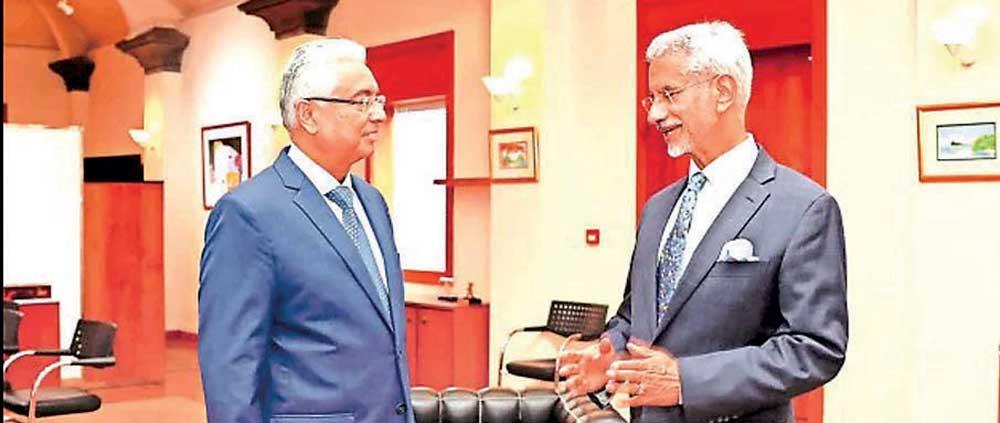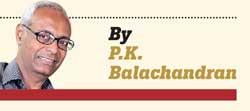Reply To:
Name - Reply Comment


Dr. S. Jaishankar with Mauritian PM Pravind Kumar Jugnauth
 Diego Garcia, which houses a major American air and naval base, is one of the islands in the Chagos archipelago which Mauritius claims. During his recent visit to Mauritius, India’s External Affairs Minister Dr.S.Jaishankar told the Mauritian Prime Minister Pravind Kumar Jugnauth that New Delhi will continue to support Mauritius in its fight to retrieve the Chagos archipelago from the UK.
Diego Garcia, which houses a major American air and naval base, is one of the islands in the Chagos archipelago which Mauritius claims. During his recent visit to Mauritius, India’s External Affairs Minister Dr.S.Jaishankar told the Mauritian Prime Minister Pravind Kumar Jugnauth that New Delhi will continue to support Mauritius in its fight to retrieve the Chagos archipelago from the UK.
 “As we look at our deep and enduring relationship, Prime Minister, I would like to again assure you today that on the issue of Chagos, India will continue its consistent support to Mauritius in line with its principal stand on decolonisation and support for the sovereignty and territorial integrity of nations,” Jaishankar said. Reciprocating the gesture, Mauritius’ Foreign Minister Maneesh Gobin said on X (formerly Twitter):“We express our deep gratitude to Dr. S. Jaishankar for reaffirming India’s consistent support to Mauritius regarding the Chagos archipelago, in alignment with India’s principled stance on decolonisation, sovereignty, and territorial integrity.”
“As we look at our deep and enduring relationship, Prime Minister, I would like to again assure you today that on the issue of Chagos, India will continue its consistent support to Mauritius in line with its principal stand on decolonisation and support for the sovereignty and territorial integrity of nations,” Jaishankar said. Reciprocating the gesture, Mauritius’ Foreign Minister Maneesh Gobin said on X (formerly Twitter):“We express our deep gratitude to Dr. S. Jaishankar for reaffirming India’s consistent support to Mauritius regarding the Chagos archipelago, in alignment with India’s principled stance on decolonisation, sovereignty, and territorial integrity.”
The Chagos archipelago was handed over to the UK by Mauritian Nationalist Leaders in 1966 as part of a bargain to secure Independence from Britain. This controversial deal got more controversial when the UK leased Diego Garcia, a large island in the Chagos archipelago, to the US in 1966, to build a naval and air base. Successive Mauritian governments have been seeking the retrieval of the archipelago, campaigning for it on 23 international platforms and even getting a “non-binding” resolution passed in their favour at the UN General Assembly in 2019.
However, the UK has to consider the fate of Diego Garcia leased to the US till 2036. The US cannot abandon Diego Garcia, given the stepped up activities of the Chinese in the Indian Ocean. Diego Garcia plays a key role in the defence of the Indian Ocean as it is bang in the middle of it. Known as an “unsinkable aircraft carrier” it played a major role as a launching pad for US airstrikes in the West Asian wars.
Today, Diego Garcia is the only US outpost in the Indian Ocean and it is doubtful if Washington will ever abandon it.
Writing in Asian Military Review in 2019 on the strategic utility of Diego Garcia to the West, Ben Ho pointed out that Diego Garcia, if not the whole of Chagos archipelago, is essential for the West’s defence against China and Russia.
“Past events show that Diego Garcia is the point d’appui (the fulcrum) for multiple lines of operations. Strategic bombers from its airstrip flew northwest to partake in Operations Desert Storm, Enduring Freedom and Iraqi Freedom. In recent years, counter-terrorism and anti-piracy operations in the Horn of Africa littoral also originated from the atoll. And last year, B-52 Strato-fortress bombers took off from Diego Garcia to conduct ostensibly freedom-of-navigation missions in the South China Sea, which is east of the island,” Ho wrote.
Diego Garcia’s location is also noteworthy for its “isolation”, Ho said. The nearest landfall is over 1,600 km away in India and it is some 3,500 km away from a potential area of operations in the northern Arabian Sea.
“Diego Garcia is thus safe, except from long-range weaponry like intermediate-range ballistic missiles, and sea-launched cruise missiles. The other advantage is that Diego Garcia has no local population other than US and UK military personnel. And it is held by friendly Britain,” Ho said.
Peter Harris pointed out in his piece in The Diplomat in 2022, that there is no danger of the US losing Diego Garcia because the Mauritian government had itself pledged to lease Diego Garcia out to the US.
This is a credible commitment given Port Louis’s close defence ties with the US, he pointed out.
INDIAN POLICY
While India’s support for Mauritius on this issue can be justified as a continuation of its policy on decolonisation, it could sour relations with the West, especially the US, with which India has built a “strategic partnership” against Chinese expansionism in the Indian Ocean and the Indo-Pacific region. The US is already somewhat dismayed with India following New Delhi’s decision to buy oil from Russia defying US sanctions. Washington was doubly unhappy when Indian Prime Minister Narendra Modi visited Moscow and firmed up India’s traditionally good relations with Russia.
US dismay came into the public domain when the US Ambassador to India, Eric Garcetti, said at a seminar in Kolkata that US-India relations were “not yet deep enough to be taken for granted.” He emphasised that “there is no such thing as strategic autonomy during a conflict.”
Laying out a condition for US-India friendship, Garcetti said: “In crisis moments we will need to know that we are trusted friends, brothers and sisters, colleagues in times of need, and the next day be acting together.”
INDIA’S STAKES
Control over the Chagos archipelago is critical for India as India is also facing a Chinese challenge in the Indian Ocean. But India’s policy is tied up with its intrinsic interest in Mauritius rather with the Western powers.
India has a very close relationship with Mauritius. Mauritius has a distinct Indian flavour. 70% of Mauritius’ 1.2 million people are of Indian origin, mostly from Eastern Uttar Pradesh and Bihar. Successive Indian governments have developed close ties with this community.
Since 2005, India has been among the largest trading partners of Mauritius. In 2022-2023, Indian exports to Mauritius was US$ 462.69 million, Mauritian exports to India was US$ 91.50 million and total trade was US$ 554.19 million.
Cumulative FDI worth US$ 161 billion came from Mauritius to India in the two decades from 2000 - 2022 (26% of total FDI inflows into India). In Mauritius, Indian companies have invested over US$ 200 million in the last five years. India and Mauritius signed a Comprehensive Economic Cooperation and Partnership Agreement (CECPA) in 2021.
In 2016, India provided a grant of US$ 353 million to Mauritius as a Special Economic Package for five priority projects. India also extended a US$ 500 million Line of Credit (LoC) in 2017 to finance social/infrastructure projects. In October 2021, an LoC of US$ 190 million and US$ 10 million grant were for a Metro Project. In August 2022, another LoC worth US$ 300 million and a grant of US$ 25 million were announced.
DEFENCE TIES
India has constructed a military facility on the Mauritian island of Agaléga. According to the New Delhi-based Observer Research Foundation (ORF), in 2015, India formalised the plan to develop the existing 800-metre airstrip at Agalega into a full-length airfield capable of receiving large and long range planes like P81.
There are plans to build a port close to the current jetty, establish institutions for intelligence and communications and install a transponder system to identify ships travelling through the Indian Ocean. The port would be used by Indian ships passing through the region for refuelling.
India has a very strong security tie up with Mauritius. Since 1974, the National Security Advisor (NSA) to the Mauritian government has invariably been an Indian national. Both Mauritius and the Seychelles have in the past requisitioned Indian security advisors to safeguard themselves against coups.
ENTER CHINA
China also has a noticeable presence in Mauritius. The Mauritius-China Free Trade Agreement was ratified in January 2021. After the ratification of the FTA, Mauritius’ exports to China increased by 148%. According to data from China’s Ministry of Commerce, Chinese cumulative investment in Mauritius reached US$ 887 million. Mauritius is also under pressure from China to sign into the Belt and Road Initiative (BRI) with China.
In 2020, protests broke out in Mauritius about India’s involvement in the Agalega base project. The Mauritian government was accused of compromising national security. India suspected the hand of China in these protests. Nevertheless, construction was completed in five years.
To add to India’s worries, the Maldivian government led by the pro-China President Mohamed Muizzu asked Indian military personnel involved in medical evacuation to leave. The Indian military men were subsequently replaced by Indian civilians.
The relationship with Maldives reached a low point and had to face opposition to its plans to build a base in Assumption Island in the Seychelles, Mauritius became pivotal in India’s quest to retain its influence in the Indian Ocean.
Hence the bid to support Mauritius on long-standing, legitimate and emotive issue of getting the Chagos Archipelago back.